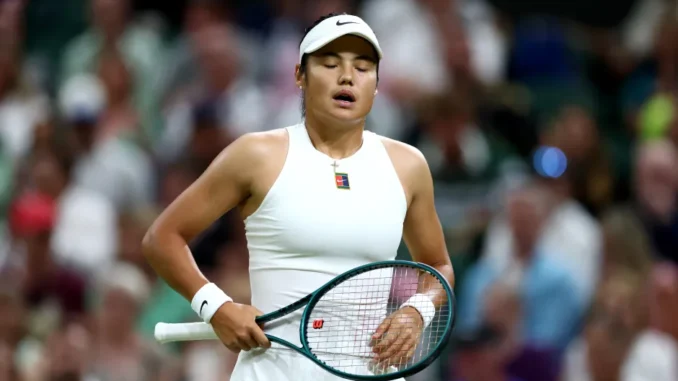
The 2025 Wimbledon Championships have been rocked by controversy as British tennis stars Emma Raducanu and Jack Draper publicly criticized the tournament’s new electronic line-calling system, prompting calls for a formal apology from the All England Club. The decision to replace traditional human line judges with Hawk-Eye’s automated technology, a first in Wimbledon’s 148-year history, has sparked heated debate after a series of questionable calls and a high-profile malfunction during a fourth-round match. Both Raducanu and Draper, Britain’s top-ranked players, expressed frustration over the system’s accuracy, igniting a firestorm that has divided players, fans, and officials.
Raducanu, the 2021 US Open champion, aired her grievances after a third-round loss to world No. 1 Aryna Sabalenka, where a critical call went against her. “That call was for sure out,” she declared in her post-match press conference, her voice tinged with exasperation. “It’s kind of disappointing, the tournament here, that the calls can be so wrong, but for the most part they’ve been okay.” The 22-year-old, who had dazzled crowds with wins over Mimi Xu and former champion Marketa Vondrousova, revealed this wasn’t an isolated incident. “I’ve had a few in my other matches, too, that have been very wrong,” she added, urging organizers to address the system’s flaws. Her defeat, a 7-6(6), 6-4 battle against Sabalenka, was a painful reminder of the fine margins that define Grand Slam tennis, and the disputed call only deepened her frustration.
Jack Draper, the men’s No. 4 seed and Britain’s leading hope in the post-Andy Murray era, echoed Raducanu’s sentiments after his second-round exit to Marin Cilic. The 23-year-old, who had entered Wimbledon with high expectations after a semi-final run at Queen’s Club, was stunned by the system’s performance. “I don’t think it’s 100 per cent accurate, in all honesty,” Draper said, pointing to specific calls that appeared incorrect. “A couple of the ones today, it showed a mark on the court. There’s no way the chalk would have showed that. I guess it cannot be 100 per cent accurate—it’s millimetres.” He lamented the absence of human umpires, noting, “I think it’s a shame that the umpires aren’t involved,” highlighting the loss of Wimbledon’s traditional officiating charm.
The controversy reached a boiling point during a fourth-round match between Russia’s Anastasia Pavlyuchenkova and Britain’s Sonay Kartal, when the electronic system was inadvertently deactivated due to human error. A shot by Kartal, visibly out, went uncalled, leading to a four-minute delay and a replayed point, much to Pavlyuchenkova’s fury. “I would just say that I hate Wimbledon and never come back here!” she quipped, half-smiling but clearly incensed. “You stole the game from me,” she told officials, criticizing their reliance on technology. “I think we’re losing a little bit of the charm of actually having human beings,” she added, reflecting a sentiment shared by many players who miss the human element of line judges.
Wimbledon officials, caught off-guard by the backlash, issued a statement acknowledging the error. “It is now clear that the live ELC system, which was working optimally, was deactivated in error on part of the server’s side of the court for one game,” they explained, apologizing to Pavlyuchenkova and Kartal. Tournament director Jamie Baker defended the system, emphasizing its widespread use across the ATP Tour and at the Australian and US Opens. “The concept of live line calling is absolutely standard across the Tour now—mandatory across the ATP Tour,” he said, insisting the technology meets the highest standards. Chief executive Sally Bolton reinforced this, stating, “We’re deeply disappointed that this has happened… The ball-tracking technology is working effectively,” while attributing the incident to human error that has since been corrected.
Former British No. 1 Tim Henman, now a BBC analyst and All England Club committee member, dismissed the players’ complaints as “utter garbage,” arguing that the Hawk-Eye system, when operational, is “absolutely 100 percent” accurate. “This is technology that’s been around for a long, long time,” he said, suggesting players’ frustrations stem from the heat of competition rather than systemic flaws. However, not all share his confidence. Two anonymous coaches expressed doubts about the system’s performance on grass, with one stating, “I don’t think it’s correct at all. Many calls seem wrong. Bring back umpires and the challenge system.” Even defending champion Carlos Alcaraz reportedly questioned a call during his match, adding to the growing chorus of skepticism.
The shift to electronic line-calling was intended to align Wimbledon with modern standards, but the transition has been far from smooth. Players like Pavlyuchenkova have criticized the loss of tradition, while accessibility concerns have emerged, with deaf spectators noting the absence of visual cues previously provided by line judges. As Wimbledon navigates this technological upheaval, the calls for an apology to Raducanu and Draper reflect broader discontent. With the tournament progressing, the All England Club faces pressure to restore confidence in its officiating, ensuring that the focus returns to the tennis rather than the technology.
Leave a Reply